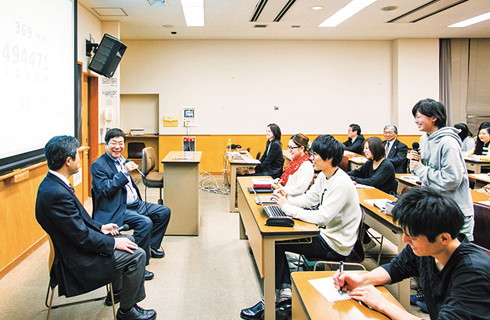Department of Business Administration
Department of Economics
Department of Business Administration
Department of International Business

Small-group classes that link theory and practice to teach students to identify and solve problems independently
Real-world economies and societies do not necessarily operate according to theory. The Department of Business Administration thus offers a well-balanced and systematic course of study in the three fields of business administration, marketing (commerce), and accounting, bearing in mind that our students may go on to be involved in corporate management. In particular, to support the individual growth of working professionals capable of independently discovering and solving problems, we emphasize small-group discussions and classes that build bridges between academic theory and corporate practice. We hope our students will aim to become sensible businesspersons who maintain high aspirations and contribute to society through business.
Business Administration
Key Features of the Department of Business Administration
Program Structure
Topics
Admission Policy
Key Features of the Department of Business Administration
Point 01
The international mindset needed to succeed in the globalized world of economics and business
Relationships with people from diverse cultural and social backgrounds will become increasingly important, even within the domestic business context. Through studies in adjacent academic domains, students acquire a broad outlook that enables them to understand social diversity.
Point 02
Improving communication skills
As our students progress in their studies, they have opportunities to engage in discussions and group work to gradually enhance the interpersonal, expressive, and writing skills they will require as businesspersons.
Point 03
Courses to assist in preparing for professional qualification examinations
The faculty offers extracurricular courses to help students pass professional qualification examinations. Courses are available to prepare students for the JCCI Bookkeeping 3rd and 2nd Grade, Financial Planning 3rd and 2nd Grade, and Information Technology Passport examinations.
Point 04
A distinctive support program of workshops to assist in finding employment
In addition to the support provided to all students by the university’s Career Center, the Faculty of Economics offers its own support program of extracurricular guidance. This program incorporates lectures and mock interviews by external speakers with experience of working for the personnel, recruitment, and training departments of major corporations, as well as guidance on how to promote oneself to prospective employers.
Program Structure
In their first year, students build a solid foundation in business administration, marketing, accounting, economics and law, after which they study key specialized subject groups in small classes that emphasize active participation in their second year. From their third year onwards, students delve into a specialized subject in seminars of approximately ten people and take courses in applied subjects. Drawing on this incrementally accumulated systematic knowledge, as well as on their ability to identify and analyze problems and express themselves, students decide on a career path at an early stage.
Topics
Workshop 1
Small-group classes begin in April of the first year and provide students with the skills they will need to study business administration, accounting, and marketing. They include group work, presentations, and discussions, and are intended to equip students with basic skills such as how to find and interpret research literature, how to collect and analyze information, and how to compose prose.

Marketing Research
Students who wish to acquire a professional and practical knowledge of marketing learn about marketing research processes, data collection, and data analysis via classes that emphasize practical exercises. In marketing, research is how we examine marketplaces. The role of research in marketing is to examine markets, and students aim to acquire the practical skills necessary to do so.

